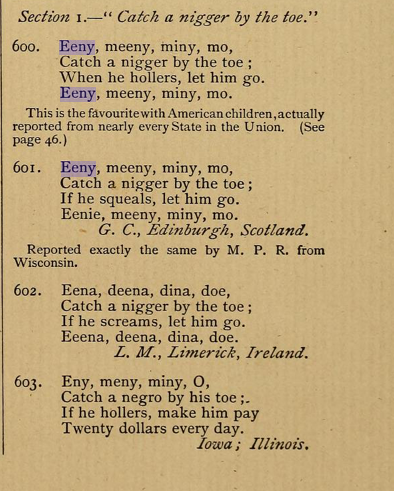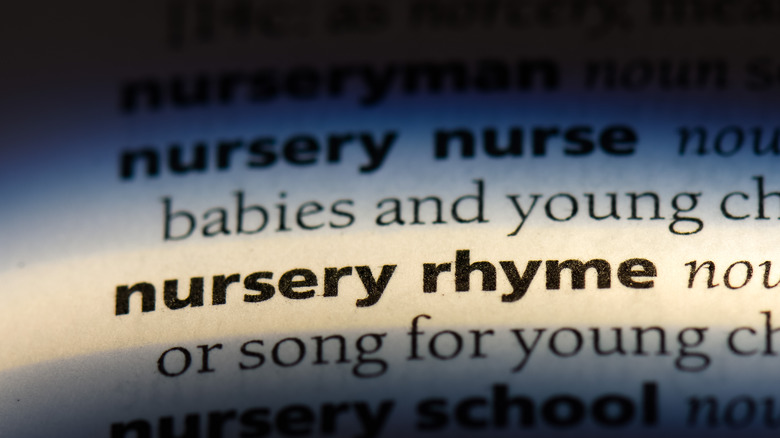

- #Origins of eenie meenie miney mo archive
- #Origins of eenie meenie miney mo code
- #Origins of eenie meenie miney mo crack
"Jimmy Crack Corn" AKA "Blue Tail Fly" is about an enslaved person whose master has died. Read more from Pancojams Racist Lyrics in Song Sources and Early Versions of the song "I've Been Working on the Railroad" and from liveaboutdotcom article here. "I've Been Working on the Railroad" AKA "The Levee Song" was used in minstrel shows and the original lyrics mock enslaved people's speech and contains racial slurs. Also see "Do Your Ears Hang Low", "Turkey in the Straw", and "Zip a Dee Doo Dah." "The Ice Cream Truck Song" is associated with a song called "N.r Love a Watermelon". "Hey Ya Na" AKA "Apache Melody" cannot be verified as being authentic. "Monkeys" was a sanitized yet veiled epithet in reference to African Americans. "Shortnin' Bread" is the chorus of "Five Little Monkeys". "Five Little Monkeys" was originally about enslaved people, one who was sick and the other one dead. In personal communication, the Maori Cultural Center was clear that this was not a song for children as it references male genitalia, bull testicles, and the virility of male warriors. From the Maori Indigenous people of New Zealand. "Epo i tai tai" is often listed erroneously as "Hawaiian". First recorded in New York City in 1815 as: Hana, man, mona, mike Barcelona, bona, strike Hare, ware, frown, vanac Harrico, warico, we wo, wac Oxford Dictionary of Nursery Rhymes shows the roots are probably Scottish or Irish where the "n word" was unknown in any English traditional rhyme or proverb. "Eenie Meenie Miney Mo" US variant uses racial slur. #Origins of eenie meenie miney mo code
"Do Your Ears Hang Low" derived from "Turkey in the Straw" which was used in minstrel shows, see NPR Code Switch article. Also see "The Ice Cream Truck Song", "Turkey in the Straw", and "Zip a Dee Doo Da" below."Cumberland Gap" has derogatory terms for African Americans, "killing" of Indigenous people, "Hell", war, and "Dinah" (see Cotton Eyed Joe"), from American Ballads and Folk Songs, John A.More information on use of "Dinah" from Collectors Weekly. Original lyrics from On the Trail of Negro Folk Songs by Dorothy Scarborough. "Cotton Eyed Joe" "Dinah" is a code word for an enslaved woman and contains a shortened racial slur."Coffee Grows on White Oak Trees" AKA "Four in the Middle" is a variant of "Can't Dance Josey" (See above).Library of Congress has the original recording. Original recording was on Holy Names University Folk Song Database and accessible until November 2019 when Holy Names was informed of racist lyrics and removed recording and sheet music. "Chicken on a Fencepost" AKA "Can't Dance Josey" the original lyrics contain racial slurs and theme of African American death.
 "Camptown Races" is a minstrel show which mocked the speech of enslaved people.
"Camptown Races" is a minstrel show which mocked the speech of enslaved people. 
See the original sheet music from the National Library. The lyrics mocked the speech of enslaved people and was sung in minstrel shows. "The Cat Came Back" was originally titled, "“The Cat Came Back: A N.r Absurdity”.It was performed in minstrel shows and mocked the speech of enslaved people. "The Boatman's Dance" was originally titled “De Boatman’s Dance".Original sheet music from the American Antiquarian Society.
#Origins of eenie meenie miney mo archive
Read more from the Traditional Tune Archive here.
"Black Joke" AKA "Hey Ho, Diddly Dum" original lyrics were vulgar and referenced sexual intercourse and female genitalia. Recent controversies around use of song and rhyme.  "Baa Baa Black Sheep" has racial slurs, from Negro Folk Rhymes, Wise and Otherwise by Thomas Washington Talley. Singer. Also see On the Trail of Negro Folk Songs by Dorothy Scarborough. Original lyrics and more information from the book, "New York and Slavery: Time to Teach the Truth" by Alan J. "All the Pretty Little Horses" has a 2nd verse referring to enslaved women's children who died as a result of white children taking their place during breastfeeding. "A Tisket a Tasket" original lyrics contains racial slurs, from Wide Awake, Volume 18. Partial List of Problematic Song Material
"Baa Baa Black Sheep" has racial slurs, from Negro Folk Rhymes, Wise and Otherwise by Thomas Washington Talley. Singer. Also see On the Trail of Negro Folk Songs by Dorothy Scarborough. Original lyrics and more information from the book, "New York and Slavery: Time to Teach the Truth" by Alan J. "All the Pretty Little Horses" has a 2nd verse referring to enslaved women's children who died as a result of white children taking their place during breastfeeding. "A Tisket a Tasket" original lyrics contains racial slurs, from Wide Awake, Volume 18. Partial List of Problematic Song Material








 0 kommentar(er)
0 kommentar(er)
